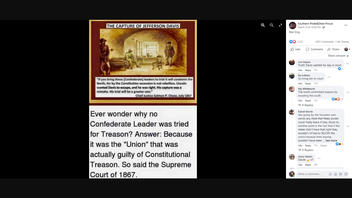
Did the U.S. Supreme Court find the Union -- the name for the United States led by then-President Abraham Lincoln during the Civil War -- guilty of "Constitutional Treason" in 1867? No, that's not true: There was never any such ruling by the Supreme Court in 1867, and the quotation by then-Chief Justice Salmon Chase used to justify the claim is unrelated to such a notion. Lead Stories also could not verify the validity of the quote attributed to Chase.
The claim appeared in a Facebook post (archived here) published on March 20, 2022. The post featured a graphic with an illustration appearing to show Jefferson Davis, president of the Confederate States of America, imprisoned. The text on the graphic read:
THE CAPTURE OF JEFFERSON DAVIS
'If you bring these [Confederate] leaders to trial it will condemn the North, for by the Constitution secession is not rebellion. Lincoln wanted Davis to escape, and he was right. His capture was a mistake. His trial will be a greater one.'
Chief Justice Salmon P. Chase, July 1867Ever wonder why no Confederate Leader was tried for treason? Answer: Because it was the 'Union' that was actually guilty of Constitutional Treason. So said the Supreme Court of 1867.
This is what the post looked like on Facebook on March 23, 2022:
(Source: Facebook screenshot taken on Wed Mar 23 16:20 2022 UTC)
As the Facebook post correctly states, leaders of the Confederacy like Davis and Robert E. Lee, a general for the Confederate States of America, were never tried for treason following the Civil War. Historians attribute this to the uncertainty of the legality of secession at the time.
However, Lead Stories reached out to legal and Civil War history experts who explained that the Supreme Court never ruled that the Union was guilty of "Constitutional Treason." Deborah Pearlstein, a professor of law at the Benjamin N. Cardozo School of Law at Yeshiva University, told us in an email sent on March 22, 2022, that no such Supreme Court decision exists. Pearlstein clarified:
Treason is an offense that can be charged by the government against an individual or individuals. As a matter of law, it makes no sense to imagine a government of any kind guilty of 'treason.'
The individual nature of the charge of treason is reflected in a Congressional website's doctrine and practice analysis of the Treason Clause. All of the example cases involved individuals rather than governments.
The Facebook post seemed to equate Chase's views on state rights to a Supreme Court decision. In an email sent to Lead Stories on March 22, 2022, William Blair, a professor emeritus of history at Pennsylvania State University, told us that Chase, who served as chief justice of the Supreme Court from 1864 to 1873, seemed inconsistent in his stance regarding state sovereignty. He noted that Chase held a strong belief in states' rights before the Civil War.
But in 1867, Chase issued a ruling in Shortridge et al. v. Macon, a circuit court case, that was based on his belief that the Confederacy, which had seceded from the Union, was not a legitimate government. And in Texas v. White in 1869, the Supreme Court deemed secession unconstitutional. Despite Chase's contradictory views regarding state sovereignty, Blair said in a separate email that Chase "would never have accused the Union of treason.'"
The validity of the Chase quote has also been questioned. In an email sent to Lead Stories on March 23, 2022, Cynthia Nicoletti, a professor of law and history at the University of Virginia, referred us to a footnote of her book "Secession on Trial: The Treason Prosecution of Jefferson Davis." The footnote explained that no primary source containing the quote has been found.
On the other hand, Blair said that while he could not verify the source of the quote, the quote would fall in line with Chase's unpredictable views:
It's clear from [Chase's] statements that he did not think you could win a court case arguing that secession wasn't possible. And, yes, that does contradict his own statement in Shortridge. Because human beings aren't consistent.
While Chase's opinions on state rights fluctuated, the Union was never found guilty of treason under the Supreme Court during his time as chief justice of the court.


















